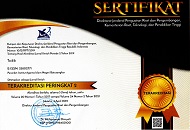- Focus and Scope
- Section Policies
- Peer Review Process
- Publication Frequency
- Open Access Policy
- Archiving
- Screening Plagiarism
Focus and Scope
FOCUS
TA'DIB provides scientific articles of education developed in attending through the article publications, original research report, reviews, and scientific commentaries in education.
SCOPE
TA'DIB encompasses research papers from researchers, academics, and practitioners. The scopes of this journal are education, instruction, development, educational projects and innovations, learning strategies and new technologies in education and learning, guidance and counselling in education, and learning assessment and evaluation. TA’DIB is an invaluable resource for teachers, counselors, supervisors, administrators, curriculum planners, and educational researchers as they consider the structure of tomorrow's curricula. TA’DIB welcomes articles concerned with the research and practices of teaching and learning at all levels: early childhood education, elementary and secondary schools, teacher education and development, and higher education.
Section Policies
editorial
Artikel
Peer Review Process
Peer Review Process
The submitted manuscript is first reviewed by an editor. It will be evaluated in the office, whether it is suitable for our focus and scope or has a major methodological flaw. This manuscript will be sent to at least two anonymous reviewers (Double-Blind Review). Reviewers' comments are then sent to the corresponding author for necessary actions and responses. The suggested decision will be evaluated in an editorial board meeting. Afterwards, the editor will send the final decision to the corresponding author.
Publication Frequency
Ta’dib is published periodically twice a year in June and December
Open Access Policy
TA'DIB publishes fully open access journals, which means that all articles are available on the internet to all users immediately upon publication. Non-commercial use and distribution in any medium is permitted, provided the author and the journal are properly credited.
Benefits of open access for author, include:
- Free access for all users worldwide
- Authors retain copyright to their work
- Increased visibility and readership
- Rapid publication
- No spatial constraints
Archiving
This journal utilizes the LOCKSS system to create a distributed archiving system among participating libraries and permits those libraries to create permanent archives of the journal for purposes of preservation and restoration. More...
Screening Plagiarism
In publishing Ta'dib strongly against any case of plagiarism on its own merits Ta'dib commits to deterring plagiarism, including self-plagiarism.
The authors should ensure that they have written entirely original works, and if the authors have used the work and/or words of others that this has been appropriately cited or quoted. Papers found with such problems are automatically rejected and authors are so advised. Also, significant parts of the work have not been published.
Before the author submits the manuscript to Ta'dib please at least check first for using a plagiarism checker. When submitting a published article for an originality check, Ta'dib recommends using Turnitin Plagiarism Scanner from http://turnitin.com. It is a totally free and easy-to-use step-by-step process. The similarity rate allowed in Ta'dib a maximum of 20 percent. Before using Turnitin for the first time, we highly recommend that the author reads the instruction to use this plagiarism detector.


























